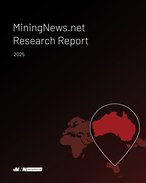This article is 9 years old. Images might not display.
The earnings figure was 51% down on 2014.
Rio posted a net loss of $866 million due to non-cash exchange rate and derivative losses of $3.3 billion and impairment charges of $1.8 billion, mostly relating to the Simandou iron ore project in Guinea, Energy Resources of Australia, and the Roughrider uranium project.
Operating cashflow was $9.4 billion, down 34%, while capital expenditure of $4.6 billion was 43% lower.
“This is a strong set of results against a challenging year for the whole industry,” Rio CEO Sam Walsh told reporters on a conference call.
Net debt at December 31 was $13.8 billion, $700 million lower than a year earlier.
“We have the strongest balance sheet of any of the majors,” Walsh said.
Rio declared a final dividend of $1.075 per share, taking the full-year dividend to $2.15, in line with 2015, or a 16% increase in Australian dollar terms.
Walsh said keeping the dividend in line with 2014 was upholding a promise made to shareholders, but the rapid and unexpected slump in commodity prices late last year had changed everything.
“I don’t think anyone predicted what’s happened in the world economy today,” he said.
“Maintaining the progressive dividend would constrain the business.
“We will focus on shareholder returns that are commensurate with the market conditions we’re in.”
The company plans to pay out 40-60% of underlying earnings in the future.
For 2016, the company has put a floor of $1.10 per share for the full-year dividend.
RBC Capital Markets analyst Paul Hissey said the change in dividend is likely to disappoint some investors.
“A payout ratio (of sorts...) is likely a better model through the cycle, but will investors feel duped given a perceived lack of benefit in better times (which would otherwise have been forthcoming under this new policy)?” he said.
Walsh said he believed Rio had got the balance right.
“It’s certainly a volatile world and people quite wisely are being cautious and signalling their concerns,” he said.
“One needs a crystal ball to see how things are going to pan out.”
Fitch Ratings said the scrapping of the progressive dividend would ease pressure on Rio’s A-credit rating.
“We see progressive dividends – where companies commit to increase, or at least maintain pay-outs – as particularly problematic in cyclical sectors such as mining because they can severely limit the ability to cut cash outgoings and maintain positive free cashflow during a commodity downturn,” Fitch said.
“BHP Billiton is the only other major mining company that still operates a progressive dividend policy and we believe it is also likely to scrap the policy when it announces annual results on 23 February.”























